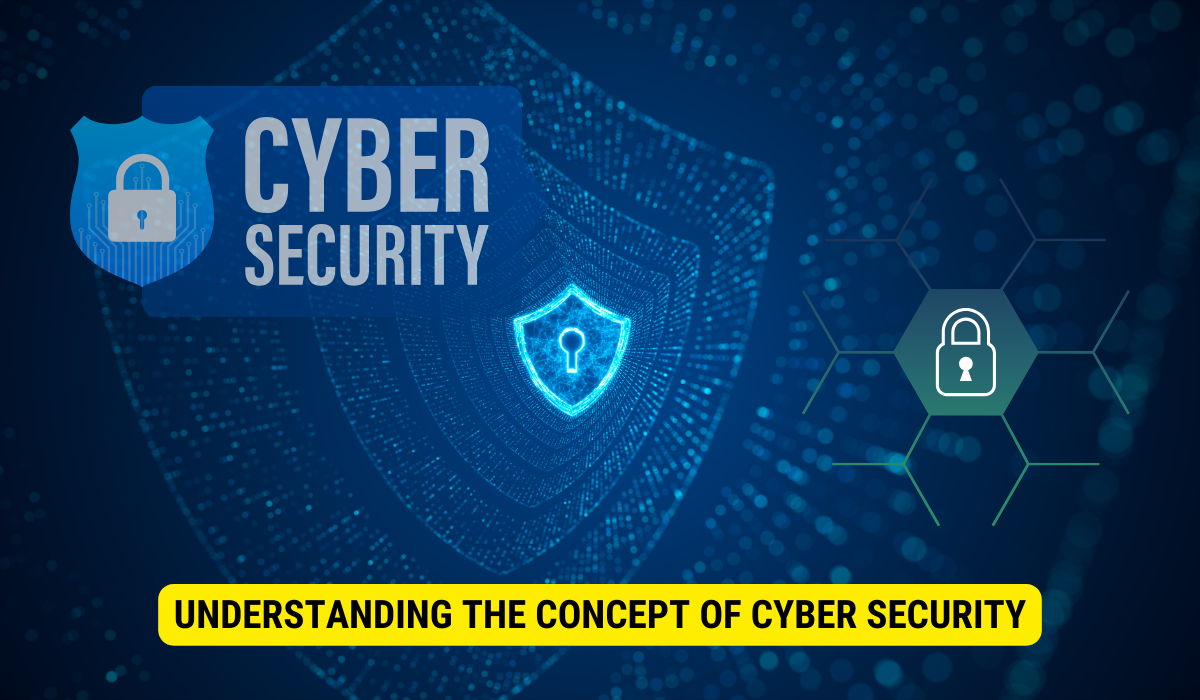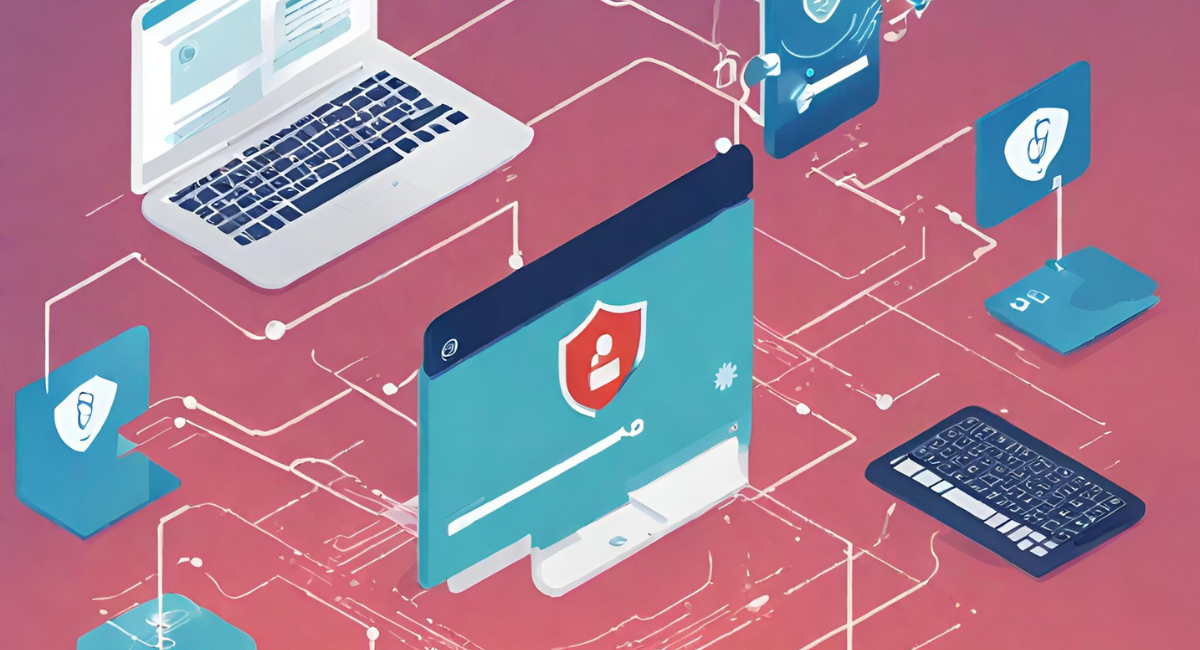Cybersecurity minimizes data leaks by implementing protective measures on computer systems, networks, and data. Techniques like encryption, firewalls, intrusion detection systems, and multi-factor authentication prevent unauthorized access and secure sensitive information.
In today’s digital age, cyber security is crucial in protecting sensitive info from falling into the wrong hands. With growing data breaches and cyber-attacks worldwide, understanding and implementing effective cybersecurity measures has become more important. We can ensure a safer digital future by comprehending the concept of cyber security, recognizing its significance, and exploring the techniques used to limit data leaks.
Understanding the Concept of Cyber Security
Cyber security protects computer systems, networks, and data from unauthorized access or damage. It involves implementing various preventive measures to defend against cyber attacks like hacking, phishing, and malware. By employing effective cyber security protocols, organizations can safeguard their valuable data, maintain the trust of their customers, and prevent potential financial losses or reputational damage.
Cyber security is a compound and ever-evolving field that requires constant vigilance and adaptation. With the quick advancement of technology, cyber threats have become more sophisticated and prevalent. As a result, organizations must stay up-to-date with the latest security practices and technologies to effectively mitigate risks.
One of the key cyber security mechanisms is the execution of security measures to protect computer systems and networks. Firewalls, for example, act as a barrier between internal networks and external threats, monitoring and filtering incoming and outgoing network traffic. Encryption is another important technique that converts data into code, making it unreadable to unauthorized users. Intrusion detection systems are planned to identify and reply to potential security breaches, alerting system administrators of suspicious activity.
Defining Cyber Security
Cyber security encompasses a range of practices and technologies designed to protect computers, networks, and data from unauthorized access or damage. It involves executing security measures, such as firewalls, encryption, and intrusion detection systems, to defend against potential threats.
Firewalls play a crucial role in cyber security by acting as a barrier between internal networks and external threats. They oversee and filter both inbound and outbound network traffic, permitting only legitimate communication. Firewalls may be either hardware or software, and they can be customized to obstruct particular kinds of traffic or limit entry to specific websites or software applications.
Encryption is another essential aspect of cyber security. It involves converting data into code, making it unreadable to unauthorized users. Encryption algorithms use mathematical formulas to scramble the data, and only those with the correct decryption key can decipher the information. This ensures that data remains secure and confidential even if it is intercepted.
Intrusion detection systems (IDS) are designed to identify and respond to potential security breaches. They monitor network traffic, looking for patterns or behaviors that indicate an attack. When an IDS detects suspicious activity, it can trigger an alert or take automated actions to mitigate the threat. IDS can be network-based, monitoring traffic at the network level, or host-based, monitoring activity on individual computers or servers.
Importance of Cyber Security in Today’s Digital Age
Organizations rely heavily on digital systems to store, process, and transmit data in today’s interconnected world. This makes them vulnerable to cyber-attacks. The consequences of a data breach can be simple, ranging from financial losses to reputational damage and legal implications. Implementing robust cyber security measures is crucial for protecting sensitive information, maintaining customer trust, and ensuring business continuity.
Given the increasing dependence on digital technologies, the importance of cyber security cannot be overstated. Organizations of all sizes and industries risk cyber attacks, and the potential impact can be devastating. A data breach may lead to losing sensitive client information, such as credit card details or personal data, leading to financial losses and legal consequences. Moreover, damaging a company’s reputation can be long-lasting, eroding customer trust and loyalty.
Cyber security also plays a dynamic role in ensuring business continuity. A successful cyber attack can disrupt operations, causing downtime and financial losses. By implementing robust security measures, organizations can minimize the risk of such disruptions and maintain their systems and data availability and integrity.
Furthermore, compliance with regulatory requirements is another reason why cyber security is essential. Organizations must adhere to Many industries’ specific regulations and guidelines, like the Health Insurance Portability and Accountability Act (HIPAA) applicable to healthcare institutions and the Payment Card Industry Data Security Standard (PCI DSS) for entities managing credit card information, are in place. Non-compliance with these guidelines may lead to substantial financial penalties and legal repercussions.
In conclusion, cyber security is a critical feature of modern-day life. It involves implementing preventive measures to protect computer systems, networks, and data from illegal access or damage. By understanding the cyber security concept and implementing robust security measures, organizations can mitigate risks, safeguard valuable data, and ensure the trust and confidence of their stakeholders.
The Connection Between Cyber Security and Data Leaks
Data leaks occur when sensitive information is exposed or accessed by unauthorized individuals. They can harm individuals, businesses, and even global security. Understanding how data leaks occur and the role of cyber security in preventing them is essential in mitigating the risks associated with these incidents.
How Data Leaks Occur?
Data leaks can occur through various means, including insider threats, hacking attacks, or accidental data exposure. Cybercriminals may exploit vulnerabilities in computer systems, social engineering techniques, or weaknesses in security protocols to gain unauthorized access to sensitive information. These breaches can have serious financial, legal, and reputational consequences for organizations and individuals.
The Role of Cyber Security in Preventing Data Leaks
Cyber security measures are instrumental in preventing and mitigating data leaks. By implementing robust security protocols and practices, organizations can decrease the risk of unauthorized entry to sensitive information. This includes using strong encryption algorithms, regular software updates and patches, and implementing multi-factor authentication systems. These measures act as barriers, making it difficult for malicious actors to compromise data integrity and confidentiality.
Techniques Used in Cyber Security to Limit Data Leaks
Several techniques are employed in cyber security to limit data leaks and enhance overall information security. These techniques focus on strengthening the security infrastructure and reducing vulnerabilities cyber criminals can exploit.
Encryption and Secure Networks
Encryption converts data into a format that unauthorized individuals cannot easily understand. Encrypting sensitive information, even in unauthorized possession, will remain indecipherable and impractical. Protected communication channels, like virtual private networks (VPNs), create a secure and encrypted connection between users and network resources, preventing unauthorized access and data interception.
Frequent Software Updates and Patches
Consistently applying software updates and patches plays a vital role in upholding the security of computer systems and applications. These updates frequently encompass improvements in security measures and corrections for identified glitches, effectively mitigating known vulnerabilities. By regularly updating software and operating systems, entities can safeguard against potential vulnerabilities, thus diminishing the likelihood of data breaches stemming from software weaknesses.
Multi-Factor Authentication

Multi-factor authentication (MFA) enhances security by necessitating users to supply various forms of authentication to confirm their identity. This generally entails the inclusion of something known only to the user (like a password), something physically possessed by the user (such as a hardware token), and a biometric identifier (like a fingerprint). Adopting MFA by businesses and institutions can substantially diminish the likelihood of unauthorized entry to confidential systems and data.
The Future of Cyber Security in Limiting Data Leaks
Cyber security is continually evolving to keep up with the ever-growing threat landscape. As new technologies emerge, cyber security must adapt to future challenges and continue to develop innovative solutions to limit data leaks.
Emerging Cyber Security Technologies
Some emerging technologies have the potential to shape the future of cyber security. These include artificial intelligence (AI) and machine learning algorithms, which can analyze vast amounts of data and detect patterns that may indicate cyber threats. By leveraging these technologies, organizations can enhance their ability to detect and prevent data leaks.
The Role of AI and Machine Learning in CyberSecurity
AI and machine learning can automate the detection and response to cyber attacks, enabling faster and more effective threat mitigation. These technologies can identify potential vulnerabilities and proactively respond to emerging threats. As data leaks become more sophisticated, AI and machine learning will be increasingly important in limiting their impact.
Challenges and Solutions in Implementing Cyber Security Measures
Implementing effective cyber security measures can be challenging, particularly due to resistance to change and the need for regular audits to ensure compliance. Overcoming these challenges is essential in promoting a security culture and protecting sensitive information from data leaks.
Overcoming Resistance to Change
One of the challenges in implementing cyber security measures is resistance to change. Employees may resist adopting new security protocols or lack awareness of potential risks. Educating employees about the importance of cyber security and providing training can help overcome this resistance and foster a security-conscious culture.
Ensuring Compliance and Regular Audits
Compliance with industry rules and standards is crucial in implementing effective cyber security measures. Regular audits help ensure security controls are in place, vulnerabilities are identified and addressed, and data leaks are minimized. Establishments can demonstrate their commitment to protecting sensitive info by following best practices and maintaining compliance.
Key Takeaways
- Cybersecurity is vital in today’s digital landscape to protect sensitive information from breaches and unauthorized access.
- Techniques like encryption, secure networks, and intrusion detection systems are foundational in preventing data leaks.
- Adopting multi-factor authentication and regular software updates enhances the defense mechanisms against potential cyber threats.
- The Rise of Artificial Intelligence and Machine Learning in cybersecurity promises enhanced threat detection and more proactive security responses.
- Overcoming challenges like resistance to change and ensuring regular audits is key for a comprehensive cybersecurity approach.
FAQs
What is the role of encryption in cybersecurity?
Encryption converts data into a coded format, making it unreadable to unauthorized users, ensuring data remains secure even if intercepted.
How do firewalls contribute to data leak prevention?
Firewalls act as barriers, monitoring, and filtering network traffic, allowing only authorized communications and blocking potential threats.
Why is multi-factor authentication considered crucial for security?
Multi-factor authentication adds an extra security layer by requiring multiple verification methods, significantly reducing unauthorized access risks.
How do regular software updates help in preventing data leaks?
Regular updates often address known vulnerabilities and introduce security enhancements, making systems more resistant to breaches.
In what ways can AI and machine learning enhance cybersecurity?
Artificial intelligence (AI) and machine learning can increase automated threat detection, analyze vast amounts of data for patterns indicating threats, and proactively respond, improving overall security efficiency.
Conclusion
Cybersecurity protects digital assets from threats and potential data leaks. With the integration of advanced technologies and adherence to best practices, organizations can effectively guard against breaches, ensuring trust and safeguarding sensitive information in the digital age.
